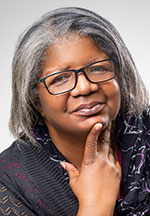Pastoral Ministries / Pearlette Springer
Eucharistic humanity: We are the one body of Christ
 In June, we kicked off a three-year National Eucharistic Revival in the Archdiocese of Indianapolis with Masses at SS. Peter and Paul Cathedral and a eucharistic procession from the cathedral to St. John the Evangelist Church. This public display of our faith took place across the United States. Catholics and non-Catholics alike stood witnessing as the Eucharist traveled through the streets of our country.
In June, we kicked off a three-year National Eucharistic Revival in the Archdiocese of Indianapolis with Masses at SS. Peter and Paul Cathedral and a eucharistic procession from the cathedral to St. John the Evangelist Church. This public display of our faith took place across the United States. Catholics and non-Catholics alike stood witnessing as the Eucharist traveled through the streets of our country.
In his Second Letter to the Corinthians, St. Paul reminds us, “… we hold this treasure earthen vessels, that the surpassing power may be of God and not from us. We are afflicted in every way, but not constrained; perplexed, but not driven to despair; persecuted, but not abandoned; struck down, but not destroyed; always carrying about in the body the dying of Jesus, so that the life of Jesus may also be manifested in our body” (2 Cor 4:7-10).
In other words, the Eucharist is more than the consecrated host, more than the real presence of Christ. It consumes the person who partakes at the table. St. Paul implies that there is another public display of the Eucharist that we see every day: He speaks of us and to us as members and followers of Christ—members and partakers of the body of Christ.
We are the Eucharist, broken and shared in community and within our society. But how do we live out this call to be the Eucharist in today’s world?
The Church teaches us that being Catholic is a way of life. It forms us to think as a person of faith in everything we do or say. It forms us to act in a way that expresses our Catholic faith. The Church teaches and forms us to live our faith through prayer, study and action.
If we look at our society today through the lens of our Catholic faith, there is no shortage of issues that need action, no shortage of minds that need to be transformed and no shortage of hearts that need to be healed.
Through the years, I have found that the best way to live the faith and be the Eucharist is through the lens of Catholic social teaching. The basic themes are interwoven, carrying the same message that leads us to live a moral life that is inclusive of all of God’s creation. Each of the themes carry the message of life and dignity of every human person. The message is that human life is sacred and is the foundation of our society. We are not a society without the human person, the sacred human life.
As St. Paul explains in his First Letter to the Corinthians, “As a body is one though it has many parts … if one part suffers, all the parts suffer with it” (1 Cor 12:12, 26 ).
In our call to family, community and participation, the family is the core foundation of the Church and society. The community is the extension of the core. As members of this one family, we are called to fully participate in its survival.
As a community, we have the collective rights and responsibilities for the parts of the body that are weaker. We are also called to the solidarity of humanity. Are we not all a creation of the one God, along with the other creatures that roam the Earth, the sky, and the waters? And the plants and the trees that nourish the air in which we breathe?
In our eucharistic humanity, as creatures of the Creator, our call is to work in solidarity, to stand up for those who live on the margins of our society and of our Church. As St. Paul states in his First Letter to the Corinthians, “Indeed, the parts of the body that seem to be weaker are all the more necessary, and those parts of the body that we consider less honorable we surround with greater honor, and our less presentable parts are treated with greater propriety, whereas our more presentable parts do not need this. But God has so constructed the body as to give greater honor to a part that is without it, so that there may be no division in the body, but that the parts may have the same concern for one another” (1 Cor 12:22-25).
As a eucharistic community, let us move forward collectively and work toward caring for those considered the weakest part of the body, caring for those considered the less honorable parts.
Let us live out our faith where we live, work, pray and play and move forward collectively, addressing the needs of our brothers and sisters, remembering we are the one body of Christ.
(Pearlette Springer is the coordinator of Black Catholic Ministry in the archdiocese. She can be reached at pspringer@archindy.org.) †
 In June, we kicked off a three-year National Eucharistic Revival in the Archdiocese of Indianapolis with Masses at SS. Peter and Paul Cathedral and a eucharistic procession from the cathedral to St. John the Evangelist Church. This public display of our faith took place across the United States. Catholics and non-Catholics alike stood witnessing as the Eucharist traveled through the streets of our country.
In June, we kicked off a three-year National Eucharistic Revival in the Archdiocese of Indianapolis with Masses at SS. Peter and Paul Cathedral and a eucharistic procession from the cathedral to St. John the Evangelist Church. This public display of our faith took place across the United States. Catholics and non-Catholics alike stood witnessing as the Eucharist traveled through the streets of our country.